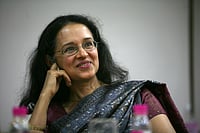A few days back, the unemployment data was the focal point of Indian economy and now the focus has shifted to a comment made by CEO of Niti Aayog, Amitabh Kant in an event in Delhi on Monday that the circular economy can generate more than 1.4 -2 crore jobs in India.
In this particular post, Outlook Money takes a quick look at the concept on circular economy.
What is circular economy?
For a long time our economy has been linear and constituted three important stages, one was production that involves converting raw materials into the product, then after using those products thy are thrown out. There is no concept of reusing or recycling. Now, with the economy on an upward spiral and the exponentially rising population, the concerns for depletion of resources and raw materials has also gained fair amount of traction. To face all the pressing issues that the economy is facing right now, the only option for us is to move to circular economy.
So basically, circular economy is an industrial system that embraces restoration and regeneration, putting an end to use and throw concept. This economic system is seen as an alternative to linear economy that is all about make, use and dispose. Thus in the circular economic system the aim is to use products optimally, to do as much as refurbishments, repackaging, remanufacturing. So the basic objective is to keep things in use as long as possible.
Is this claim of generating 1.4 million jobs right or wrong?
Looking at the other parts of the world, the claim seems to be true. In 2014, European Commission estimated that jobs associated with circular economy employed 3.9 million people. And International Labour Organisation has projected that under circular economy worldwide, the employment would grow by 0.1% by 2030. The 2018 report by Cambridge Econometrics and Trinomics and ICF titled as Impact of Circular Economy Policies on Labour Markets, concludes that circular economy will add 0.5 % to Europe’s GDP and a net increase of 700,000 jobs. A 2017 report by Circle Economy and Ehero estimates that 8 % of the Dutch workforce is currently employed in circular economy jobs. So after looking at the data from all other countries of the world, it seems true that circular economy has potential to generate 1.4 crore jobs in next 5-7 years.
Which countries have already embraced circular economy?
There are many countries in the world that have a piece of legislation that made mandatory on every ones part to reuse the products. Denmark, Netherlands, Sweden, Japan, Scotland are a few countries those who have adopted legislation to push the reuse and refurbish things. These countries have their own goals set for the respective years in order to get desired result from this economical transition. For example: The Danish government set a goal to recycle 50% of all household waste by 2022. Similarly many other countries are also have set goals. China also has circular economy in its policy since 2000.
What to hope for?
Now, with this comment of Amitabh Kant, now the speculations are rife that whether the government will bring in any piece of legislation, taking cue from European countries such as Denmark, Sweden and Netherlands. To get clarity on this issue we will have to wait and watch, that what necessary actions this government is going to take.































